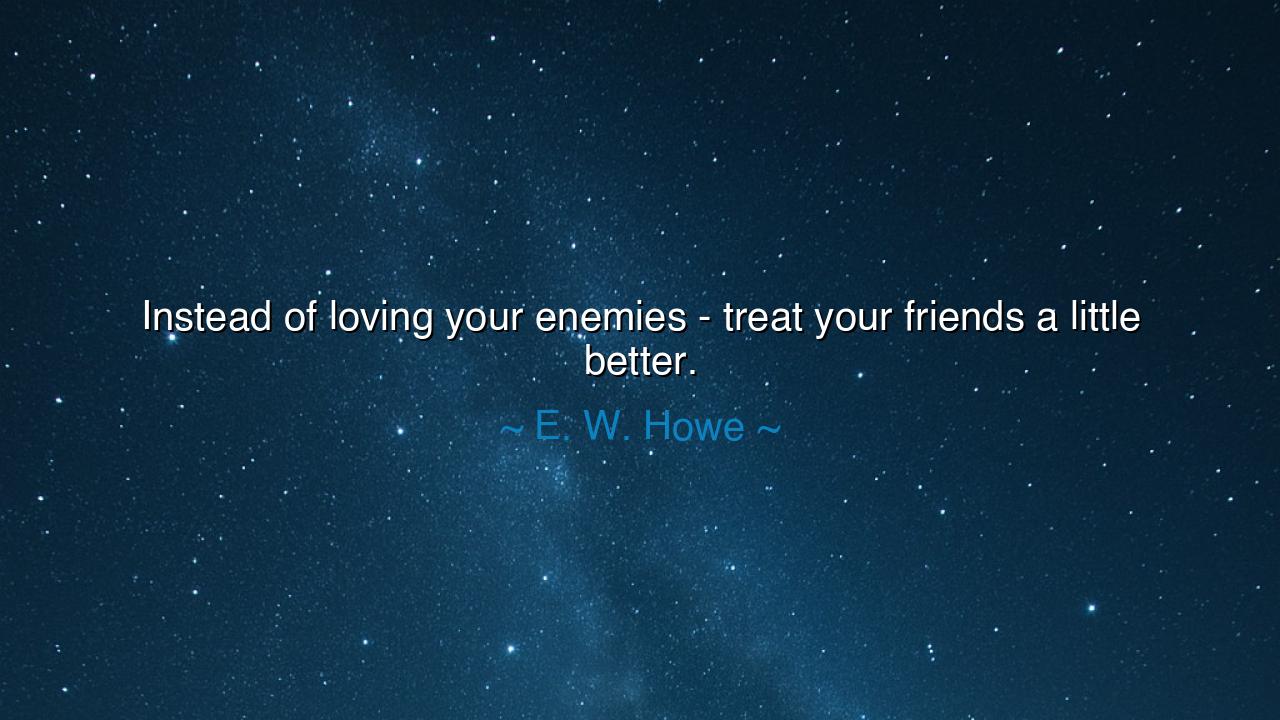
Instead of loving your enemies - treat your friends a little






In the wry yet deeply insightful words of E. W. Howe, the American philosopher and essayist of quiet wisdom, we hear a truth both humorous and profound: “Instead of loving your enemies — treat your friends a little better.” Beneath its wit lies a lesson that has echoed through centuries of human experience — that goodness is not a matter of lofty ideals, but of humble actions; that love, before it becomes divine, must first be human. Howe, known for his sharp understanding of ordinary life, reminds us that while noble teachings often bid us to love our enemies, the greater and more practical virtue may lie in cherishing those who already love us — our friends, our companions, our kin.
At first glance, the saying seems to turn sacred teaching on its head. The words of Christ — “Love your enemies” — call us toward the highest form of compassion, a love that transcends bitterness. Yet Howe, the philosopher of everyday life, asks us to begin closer to home. He saw that many who speak of universal love neglect the ones who stand beside them. How easy it is to dream of forgiving one’s enemies, while failing to show patience with a friend’s weakness! How easy to speak of love for humanity, while overlooking the small acts of kindness that sustain our daily bonds. Howe’s wisdom is not a rejection of mercy, but a call to sincerity — to prove our goodness not by our ideals, but by our treatment of those who trust us.
The meaning of this quote is simple yet piercing: our greatest moral duty is often not in distant heroism, but in the nearness of friendship. To “treat your friends a little better” means to show gratitude, gentleness, and understanding to those who have stood by you in joy and hardship. It means not taking for granted the steady hearts who give without asking. Many men chase the impossible dream of universal benevolence, but forget the simple gift of kindness toward those who already love them. Howe teaches us that charity begins not with enemies, but with companionship — that if we can master love in the small circle of friendship, we may someday extend it to the greater circle of the world.
The origin of this wisdom lies in Howe’s own life and philosophy. Living in the late 19th and early 20th centuries, he was a keen observer of human folly and virtue. His writings, collected in Country Town Sayings and Ventures in Common Sense, reflected the voice of a man who had lived among common people, who knew their struggles and pretensions alike. He saw that many men strive for moral grandeur — to appear saintly, generous, magnanimous — yet fail in the ordinary decency of kindness. To Howe, friendship was not a social convenience, but a sacred trust; and to neglect it while aspiring to love one’s enemies was hypocrisy in its gentlest form.
History gives us countless examples of this truth. Consider Marcus Aurelius, the philosopher-emperor of Rome, who wrote in his Meditations about the duty to forgive his enemies and endure the ignorance of mankind. Yet, amid his lofty reflections, he often mourned the loneliness of power — how even the wise can forget to cherish those who walk beside them. Surrounded by generals, advisors, and family, he confessed that it is easy to love mankind in general, but difficult to be gentle with one’s own household. And so it is for all of us: to speak kindly to those near us requires more humility than to forgive an enemy we never see.
Howe’s insight, though cloaked in humor, is a challenge to the soul. He bids us ask: Do I nourish my friendships, or take them for granted? Do I show gratitude to those who stand beside me, or do I save my compassion for grand gestures toward strangers? Every friendship is a living flame — and like all fires, it must be tended, or it will fade. To treat your friends a little better means to forgive quicker, to listen longer, to speak with kindness even when weary. It means remembering that the love we practice daily is worth more than the love we only preach.
The lesson is both humble and powerful: do not wait for grand acts of virtue to prove your goodness. Begin with the small, quiet graces that bind the world together. Write a letter of thanks. Speak a kind word. Defend a friend when others criticize. Forgive a mistake before it festers. The world’s peace begins in these small acts of loyalty and love. Howe teaches that it is not by embracing our enemies that we make the world kinder, but by cherishing those who already share our hearts.
So, dear listener, let these words of E. W. Howe be your guide: “Instead of loving your enemies — treat your friends a little better.” Do not measure your virtue by how nobly you think, but by how gently you live. For friendship is a sacred trust, and those who honor it create a world where kindness is not theory, but practice — not philosophy, but life itself. Love need not begin in heroism; it begins in gratitude. And if we learn to treat our friends a little better, perhaps, one day, we will find that even our enemies have become friends.






AAdministratorAdministrator
Welcome, honored guests. Please leave a comment, we will respond soon